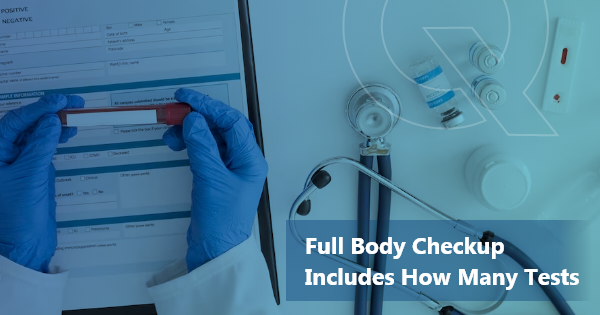Are you scheduled for a full body checkup but uncertain about what lies ahead? Rest assured, we’re here to guide you through it all! In this all-encompassing guide, we’ll take you on a journey through the entire spectrum of a full-body checkup, detailing every test you can expect. From blood work to diagnostic scans, we’ll provide you with the essential information to help you prepare for your appointment and maximise the benefits of your health Full Body Checkup test list.
Contents
What is Full Body Checkup?
A standard doctor’s appointment for a full body checkup typically involves several sequential stages. Initially, your weight, height, and blood pressure are routinely assessed. Subsequently, you can anticipate a discussion about your overall health, encompassing any ongoing or chronic medical conditions, along with inquiries about your pertinent medical history. Following this, the physician will employ a stethoscope to auscultate your heart and lungs while conducting an abdominal examination to detect any anomalous lumps or masses. Ultimately, as part of the comprehensive assessment, you will undergo routine tests, including a urinalysis and blood work.
List of Full Body Checkup
A comprehensive full body checkup typically encompasses a range of tests that can vary based on factors like your age and health history. In general, the tests in a full body checkup list cover:
1. Blood Pressure Assessment: This evaluates the force of blood against artery walls during heartbeats.
2. Cholesterol Levels Check: This measures cholesterol levels in your blood, a key factor in heart disease risk.
3. Blood Sugar Evaluation: It assesses blood sugar levels, which can indicate diabetes risk.
4. Body Mass Index (BMI) Calculation: This determines body fat based on height and weight, highlighting obesity risks.
5. Waist Circumference Measurement: It gauges waist size to identify abdominal obesity, linked to health issues.
6. Urinalysis: A test for proteins, red/white blood cells, and other substances in urine, helpful for diagnosing kidney or urinary tract issues.
7. Thyroid Function Tests: These assess thyroid hormone levels, detecting thyroid problems.
8. Electrocardiogram (ECG): This records heart electrical activity, aiding in heart rhythm issue diagnosis.
9. Chest X-Ray: It produces images of your chest’s interior, identifying lung or heart abnormalities.
10. Lung Function Tests: These measure lung performance, diagnosing conditions like asthma or COPD.
11. Pap Test: It screens for cervical cancer by detecting abnormal cervical cells.
12. Mammogram: A breast cancer screening tool.
13. Colonoscopy: Used for colon cancer detection.
14. Bone Density Test: Measures bone strength and identifies osteoporosis risk.
15. Skin Examination: Detects unusual moles or skin changes, possibly indicative of skin issues.
These comprehensive tests offer insights into your overall health and can help identify potential health concerns.
Benefits of Full Body Checkup
A full body checkup offers several benefits:
1. Early Detection: It can help detect health issues at an early stage, allowing for timely intervention and treatment.
2. Disease Prevention: It provides a comprehensive overview of your health, enabling you to take preventive measures to reduce the risk of developing certain diseases.
3. Peace of Mind: Regular checkups can provide peace of mind by confirming that you’re in good health or identifying areas that need improvement.
4. Personalized Health Plan: Based on the results, healthcare professionals can create a customised health plan tailored to your needs.
5. Improved Lifestyle Choices: Knowing your health status can motivate you to make healthier lifestyle choices, such as diet and exercise.
6. Cost-Effective: Detecting and addressing health issues early can be more cost-effective than treating advanced illnesses.
7. Long-Term Health Monitoring: It establishes a baseline for your health, allowing for long-term monitoring of changes and trends.
8. Reduced Healthcare Costs: Preventing or managing chronic diseases early can lead to reduced healthcare expenses over time.
9. Better Quality of Life: Maintaining good health through regular checkups can contribute to an improved quality of life.
10. Family Health Awareness: It can also raise awareness about hereditary health conditions that may affect your family.
Remember to consult with a healthcare professional to determine the frequency and specific tests needed for your full body checkup based on your age, gender, and medical history.
Who should go for a Full Body Checkup?
A full body checkup can benefit individuals of various ages and health statuses. Here are some guidelines on who should consider going for a full body checkup:
1. Adults of All Ages: Regular checkups are recommended for adults to monitor their overall health status and detect potential health issues early.
2. Individuals with Family History: If you have a family history of certain diseases, such as heart disease, diabetes, cancer, or other hereditary conditions, you may benefit from more frequent checkups.
3. Those with Chronic Conditions: People managing chronic illnesses like diabetes, hypertension, or heart disease should undergo regular checkups to monitor their condition and treatment effectiveness.
4. Ageing Adults: As individuals age, the risk of certain health conditions increases. Regular checkups become more crucial for older adults to maintain good health.
5. Pre-Employment or Insurance Requirements: Some employers or insurance providers may require a full medical examination as part of their employment or coverage policies.
6. Health Conscious Individuals: If you are proactive about your health and want to ensure you are on the right track with your diet, exercise, and overall well-being, a regular checkup can provide valuable insights.
7. Those with Unexplained Symptoms: If you are experiencing unexplained symptoms, discomfort, or changes in your health, a checkup can help identify the underlying cause.
8. Women’s Health: Women may require additional screenings like mammograms and Pap smears as part of their regular checkups to monitor breast and cervical health.
9. Men’s Health: Men may benefit from prostate cancer screenings and other gender-specific tests during their checkups.
It’s essential to consult with a healthcare professional to determine the appropriate frequency and specific tests needed for your full body checkup based on your age, gender, medical history, and risk factors. They can tailor the checkup to your individual health needs.
The specific tests included in a full body checkup may also be customised based on the individual’s age and gender. Women, for instance, may have additional tests related to gynaecological health, while men may have specific tests related to prostate health.It’s essential to consult with a healthcare provider or a clinic that offers full body checkup packages to determine the exact tests that will be included in your checkup based on your health profile and goals. A healthcare professional can help tailor the checkup to your unique needs and ensure that you receive a comprehensive evaluation of your health.





